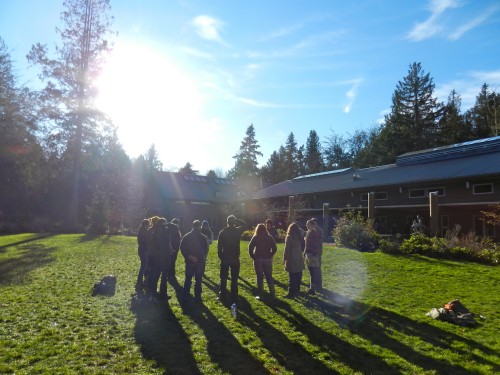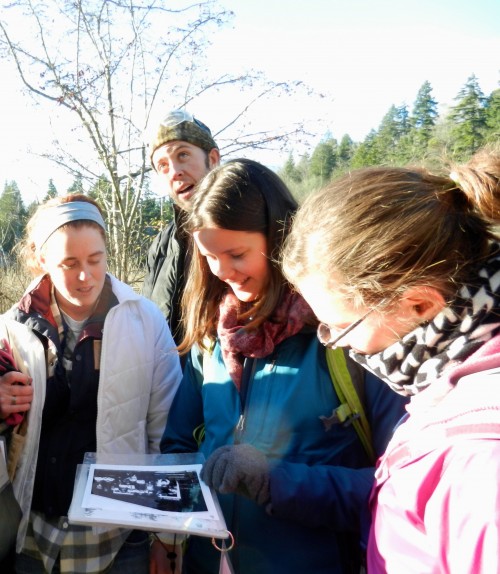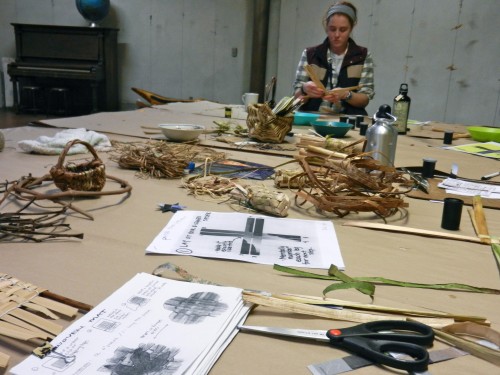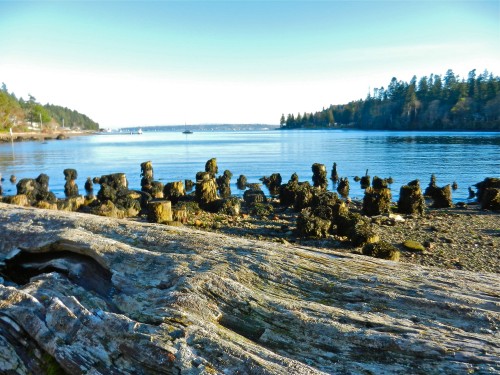Graduate Students Attend Environmental Education Conference

Students in the M.E.d Graduate Program celebrated the start of winter break with the Strait Talk, Sound Ideas Conference on Bainbridge Island from December 11th through 13th. As part of a series of three Instructor Exchanges aimed at sharing ideas and experiences between Environmental Education graduate programs in Washington, this conference kicked off the set hosted each by Islandwood, the Wilderness Awareness School and the North Cascades Institute.
Strait Talk, Sound Ideas brought together naturalists and outdoor educators at the Islandwood campus for keynote speakers, workshops and breakout sessions. The three-day event began with an evening of sharing songs and skits and served as an introduction to each other and our programs. Participants took advantage of one of the most beneficial parts of a gathering like this, the informal conversations and discussions about each other’s work in the field of Environmental Education.
Early risers took a guided bird walk on the first morning, listening for over wintering birds along the trails throughout the Islandwood campus. The resident barred owls heralded in what would be a busy two days to follow. As a way to get our bearings the group was divided into teams and set out on a campus-wide scavenger hunt that had graduate students running through the woods attempting to complete group challenges and check off as many items on their lists as possible the perfect initiation to a new place. Throughout the conference the Islandwood graduate students and staff used hiking, art, and naturalist activities to share their landscape and their home with participants.

Graduate students explore the cultural history of Bainbridge Island during a breakout session.
Three speakers provided a framework for the conference. Erin Grady, a former Islandwood graduate student, gave a very informative presentation on working with children who have attention deficit struggles, and shared insight into how environmental and experiential education can be a positive tool in working with these students. The presentation paired perfectly with one given by Islandwood graduate faculty member Pat Guild O’Rourke on teaching to different learning styles, which focused on how fostering individual learning style strengths can enhance student learning. John Haskin rounded out the presentations with an evening of living history on the second night of the conference, which, complete with historical dress and music, told the story of Bainbridge Island and Blakely Harbor.

M.E.d. Graduate student Susan Brown weaves cattails during an afternoon workshop.
Breakout sessions and workshops filled the rest of the time at Islandwood. Topics included weaving with cattails, cultural history hikes, sharing team-building challenges and lessons, storytelling, creative writing, and working outdoors with English language learners. Sessions were taught by Islandwood staff and graduates, as well as by participants from Wilderness Awareness School and the North Cascades Institute, and provided everyone with the opportunity to explore certain topics in a smaller, more in-depth setting.

View of Puget Sound from Blakely Harbor.
Over the course of the conference we shared educational ideas and techniques, songs and games, and naturalist tips, but we also shared place. Tucked away as we are up in the Cascades, visiting the Puget Sound and seeing how our peers teach about their island home was refreshing and inspiring when working with students we all bear in mind the same goals, yet with a completely different landscape to serve as the classroom. It will be a treat to host the three programs at the Environmental Learning Center in January 2012.
All photos contributed by the author.


This sounds like a wonderful way to kick off the exchanges. I love to see the progression of this important meeting of the minds. Great post!
The fact that the three graduate programs in environmental education located in the Pacific Northwest share ideas and approaches is most encouraging to me. Competition sharpens us all…but far too often, educational and professional programs fall into silent, unproductive modes of competition that serve no one.
The future of our environment needs all the collaboration and mutual support between advocates that professionals such as you can muster. I needn’t expound on the urgency of the work being performed by NCI, Wilderness Awareness School and Islandwood. Your writing is an important contribution to that end. Go forward, learn, share and educate!